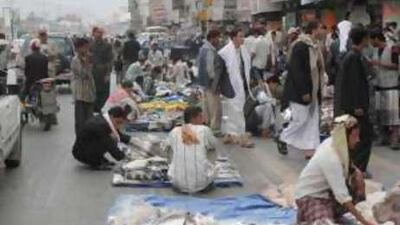SANA'A // Yemen, one of the poorest countries in the world, said it is hopeful the Gulf Co-operation Council (GCC) summit starting today in the Omani capital, Muscat, will lead to the country's further development for it to join fully the GCC. "We are already members of three ministerial institutions and the Gulf football tournament. This time it will be announced that we will join other institutions. However, the most important thing is we hope the GCC states leaders will look into the question of development challenges in Yemen," said Abu Bakr al Qirbi, Yemen's foreign minister.
Forty-two per cent of Yemen's 22 million people live on less than US$2 per day (Dh7.34), and unemployment runs at 35 per cent, according to World Bank statistics. "Development is one of the key challenges we are facing now. The GCC states had made generous contributions to support development at the London conference for donors in 2006 by $2.7 billion. As we are now setting up a new development plan, we hope the GCC will look into how they can support this forthcoming plan," Mr al Qirbi said.
Yemen has been vying for formal GCC status for several years and has partial observer status on some committees, giving the impression that full membership may not be that far off. "Yemen is not ready to join the GCC at this moment. But this does not mean we cannot join because we are weak. We are in the process of joining but we would like to join when we are ready," said Hisham Sharaf, Yemen's deputy minister of planning and international co-operation.
He said Yemen needs to upgrade its laws to be in accord with those of GCC members and build its economy to become close to the level of the GCC. That is why Yemen sees this conference as key to helping it qualify for GCC membership. "We need from the GCC to go with us in financial programmes which will develop our economy and human resources," Mr Sharaf said. The Abu Dhabi summit in Dec 2005 came up with the resolution of starting the process of Yemen's integration to the bloc by 2015. The decision to support development and infrastructure projects in Yemen was also made then.
"There was a small delay in using the funds from the GCC states because of arrangements, problems of preparing feasibility studies as well as fulfilling the requirements of some of the financing agencies," Mr Sharaf said. "This delay, however, does not mean we cannot absorb or need the money. Our vision is clear that we need to upgrade our infrastructure and our economy." However, he said the next two years will see the implementation of most of the projects that received funding in 2006 by the Gulf countries. He said the $2.7bn contribution of the GCC will be used to improve roads, power, water and education as well as for vocational training.
About US$4.7bn was pledged for the four-year period 2007-2010 at the fourth Consultative Group meeting of donors for Yemen, held in London in Nov 2006. Mr Sharaf said there is no fixed timeline for Yemen to have full membership in the GCC. "Some people say we can gain the full membership by 2015. But I can say there is no fixed date," he said. "This depends on how we together work to achieve this goal. If we work hard, we can do it before the set time but if there are challenges like the current financial problem, the process might take more five years. The most important thing is not joining but how the GCC countries will help Yemen be a member ready to join."
He said the GCC will also benefit from having Yemen as a member. "Yemen will benefit in terms of finding a market for its labour and getting Gulf investments into Yemen. This will help address the unemployment problem for Yemen. Labour can replace most of the foreign workforce in the Gulf countries. The Gulf states will find in Yemen big purchase power," he said. "Yemen's geographical position is important for the security of the Gulf and Arabian Peninsula. It is a mutual interest."
Mohammed al Sabri, a political analyst, said two main factors in determining how long it takes Yemen to gain GCC membership are the level of the support it receives from the United States and Europe and how the country deals with internal issues, such as the social unrest in the south and the failure of the ruling party and opposition to agree on a date for parliamentary elections. "We are concerned that unless these problems are addressed, they might turn Yemen into a focus of problems at the back of the Gulf countries," Mr Sabri said.
malqadhi@thenational.ae

